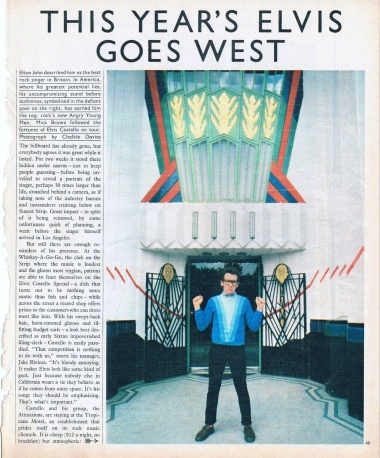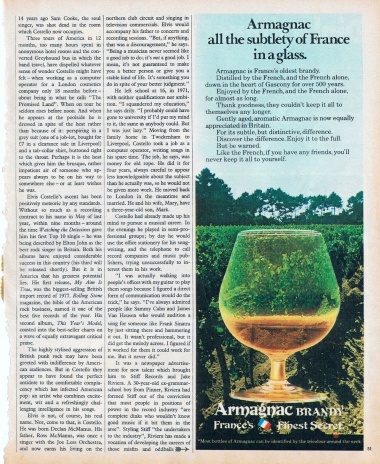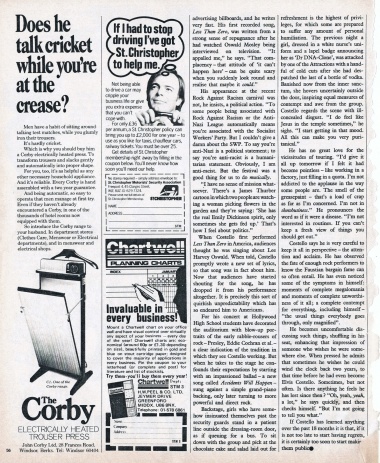|
The billboard has already gone, but everybody agrees it was great while it lasted. For two weeks it stood there hidden under canvas — just to keep people guessing — before being unveiled to reveal a portrait of the singer, perhaps 30 times larger than life, crouched behind a camera, as if taking note of the industry barons and tastemakers cruising below on Sunset Strip. Great impact — in spite of it being removed, by some unfortunate quirk of planning, a week before the singer himself arrived in Los Angeles.
But still there are enough reminders of his presence. At the Whiskey-A-Go-Go, the club on the Strip where the music is loudest and the gloom most stygian, patrons are able to feast themselves on the Elvis Costello Special — a dish that turns out to be nothing more exotic than fish and chips — while across the street a record shop offers prizes to the customers who can dress most like him. With his swept-back hair, horn-rimmed glasses and ill-fitting budget suits — a look best described as early Sixties impoverished filing-clerk — Costello is easily parodied. "That competition is nothing to do with us," snorts his manager, Jake Riviera. "It's bloody annoying. It makes Elvis look like some kind of geek. Just because nobody else in California wears a tie they behave as if he comes from outer space. It's his songs they should be emphasising. That's what's important."
Costello and his group, the Attractions, are staying at the Tropicana Motel, an establishment that prides itself on its rock music clientele. It is cheap ($12 a night, no breakfast) but atmospheric: 14 years ago Sam Cooke, the soul singer, was shot dead in the room which Costello now occupies.
Three tours of America in 12 months, too many hours spent in anonymous hotel rooms and the converted Greyhound bus in which the band travel, have dispelled whatever sense of wonder Costello might have felt — when working as a computer operator for a London cosmetics company only 18 months before — about being in what he calls "The Promised Land." When on tour he seldom rises before noon. And when he appears at the poolside he is dressed in spite of the heat rather than because of it: perspiring in a grey suit (one of a job-lot, bought for £7 in a clearance sale in Liverpool) and a tab-collar shirt, buttoned tight to the throat. Perhaps it is the heat which gives him the brusque, rather impatient air of someone who appears always to be on his way to somewhere else — or at least wishes he was.
Elvis Costello's ascent has been positively meteoric by any standards. Without so much as a recording contract to his name in May of last year, within nine months — around the time "Watching the Detectives" gave him his first Top 10 single — he was being described by Elton John as the best rock singer in Britain. Both his albums have enjoyed considerable success in this country (his third will be released shortly). But it is in America that his greatest potential lies. His first release, My Aim Is True, was the biggest-selling British import record of 1977. Rolling Stone magazine, the bible of the American rock business, named it one of the best five records of the year. His second album, This Year's Model, coasted into the best-seller charts on a wave of equally extravagant critical praise.
The highly stylised aggression of British punk rock may have been greeted with indifference by American audiences. But in Costello they appear to have found the perfect antidote to the comfortable complacency which has infected American pop: an artist who combines excitement, wit and a refreshingly challenging intelligence in his songs.
Elvis is not, of course, his real name. Nor, come to that, is Costello. He was born Declan MacManus. His father, Ross MacManus, was once a singer with the Joe Loss Orchestra, and now earns his living on the northern club circuit and singing in television commercials. Elvis would accompany his father to concerts and recording sessions. "But, if anything, that was a discouragement," he says. "Being a musician never seemed like a good job to do; it's not a good job. I mean, it's not guaranteed to make you a better person or give you a stable kind of life. It's something you do in spite of your better judgment."
He left school at 16, in 1971, with neither qualifications nor ambition. "I squandered my education," he says drily. "I probably could have gone to university if I'd put my mind to it, the same as anybody could. But I was just lazy." Moving from the family home in Twickenham to Liverpool, Costello took a job as a computer operator, writing songs in his spare time. The job, he says, was money for old rope. He did it for four years, always careful to appear less knowledgeable about the subject than he actually was, so he would not be given more work. He moved back to London in the meantime and married. He and his wife, Mary, have a three-year-old son, Mark.
Costello had already made up his mind to pursue a musical career. In the evenings he played in semi-professional groups; by day he would use the office stationery for his songwriting, and the telephone to call record companies and music publishers, trying unsuccessfully to interest them in his work.
"I was actually walking into people's offices with my guitar to play them songs because I figured a direct form of communication would do the trick," he says. "I've always admired people like Sammy Cahn and James Van Heusen who would audition a song for someone like Frank Sinatra by just sitting there and hammering it out. It wasn't professional, but it did get the melody across. I figured if it worked for them it could work for me. But it never did."
It was a newspaper advertisement for new talent which brought him to Stiff Records and Jake Riviera. A 30-year-old ex-grammar-school boy from Pinner, Riviera had formed Stiff out of the conviction that most people in positions of power in the record industry "are complete dinks who wouldn't know good music if it bit them in the arse." Styling Stiff "the undertakers to the industry," Riviera has made a vocation of developing the careers of those misfits and oddballs
|





